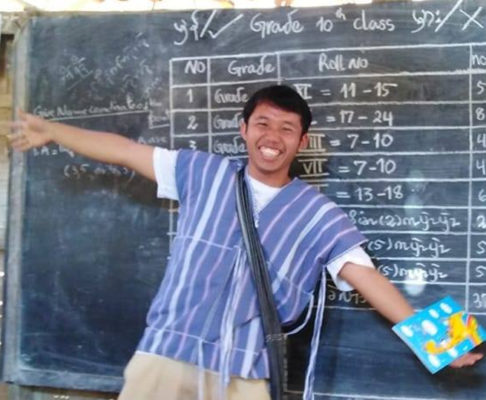 On February 8, I went to the Karen State in Burma (Myanmar) with the staff from a non-government organisation and foreigners who wanted to help the Karen people, one of the largest ethnic groups in Southeast Asia.
On February 8, I went to the Karen State in Burma (Myanmar) with the staff from a non-government organisation and foreigners who wanted to help the Karen people, one of the largest ethnic groups in Southeast Asia.
When we arrived at Mae Sam Lap in Mae Hong Son province in Thailand, which borders the Karen State to the east, we looked for a boat so we could cross the Salaween river to get to the Karen State. I had always wondered what it would be like there. What would I see? I guessed it would be the remnants of war, the image of inequality and the picture of poor people who do not have enough food to eat.
 When I arrived, I learnt that the people of the Karen State escaped the Myanmar Army. For six decades, the Karen people have suffered from a civil war between ethnic opposition groups fighting for self-determination and the Myanmar Army. Some of their family members have been killed in the conflict.
When I arrived, I learnt that the people of the Karen State escaped the Myanmar Army. For six decades, the Karen people have suffered from a civil war between ethnic opposition groups fighting for self-determination and the Myanmar Army. Some of their family members have been killed in the conflict.
The students wear Karen shirt and skirt in school. The school is made of bamboo and the roof is made out of leaves. They need to change it every year because the leaves deteriorate easily. The school is old and some classrooms are already weather-beaten. At 7:30 am, the teachers and students sing the Karen National Hymn. I had never heard it before. It was only in the Karen State that I was able to listen to it. They are really proud that they were born in Kaw Thoo Lai (the Karen name of their State).
The people in the Karen State cannot speak Thai. I always thought they could, but I was wrong. Learning the Thai language is very important to them because they must buy rice, shirt and other things they need in Thailand.
Education is really important for them. Going to a good school is everyone’s dream, but the parents do not have enough money to send their kids to school. The parents cannot study even if they wanted to because they do not hold any citizenship. They do not have an ID card or a passport.
If you think you are living a bad life, I would like to tell you that the Karen people have lived through worse. The area I was working in was destroyed by the war. They only eat twice a day. If they have money, they will use it to buy rice grains to plant. However, they cannot plant that much because the rice and crops will only be destroyed by another war. After a few weeks working there as a Thai language teacher, I asked the villagers, “Are you afraid of the Myanmar Army?” They said, “Yes”.
I stayed there for one month and 12 days. I taught the students and worked with them. My perspective in life changed and I promise to share my experiences with my friends and family in Thailand. I will not forget my dear students and the teachers I worked with. I will always remember their smiles, laughter and their hospitality. I will return to the Karen State one day and I hope you can join me. The Karen people there are waiting for your help. They are waiting in Salaween.
 Narongdet Chuanchuenchom is a freshman at Xavier Learning Community, a Jesuit institution of higher learning in Chiang Rai, Thailand. He worked as a volunteer teacher in Karen State.
Narongdet Chuanchuenchom is a freshman at Xavier Learning Community, a Jesuit institution of higher learning in Chiang Rai, Thailand. He worked as a volunteer teacher in Karen State.

